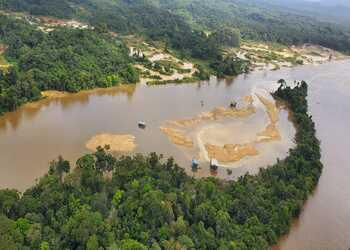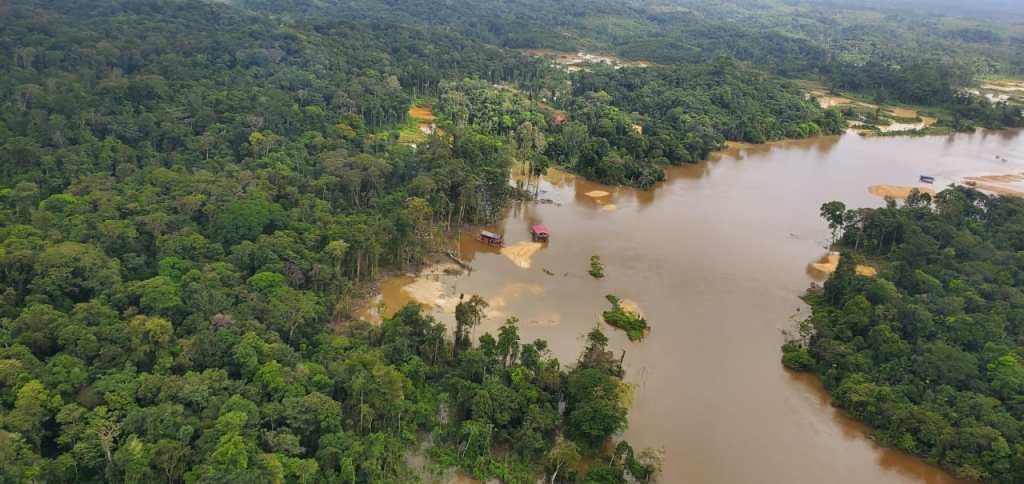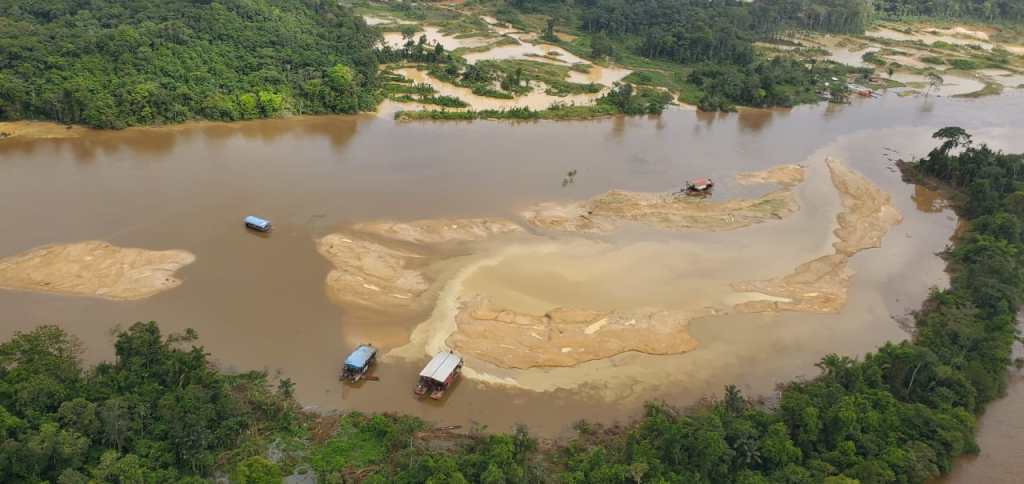CRIMINAL CAPITALI$M
Destructive Gold Mining Plagues Suriname, French Guiana Border
30 MAY 2022 BY SCOTT MISTLER-FERGUSONEN
Large-scale illegal gold mining continues to operate in plain sight on the Lawa River, a natural border between French Guiana and Suriname, despite public efforts from both governments to end the environmentally destructive practice.
Photographs obtained by InSight Crime show at least six gold dredgers, or skalians, as they're known in Suriname, operating on the river earlier in May.
Illegal mining operations have garnered widespread condemnation for the environmental degradation they cause in both Suriname and French Guiana.
SEE ALSO: Dirty Business - The Smuggling Pipeline Carrying Mercury Across the Amazon
The use of the heavy metal, mercury, which binds to gold, is especially detrimental. Runoff mercury pollutes the river and its populations of fish, damaging an important source of food for local indigenous communities, local media have reported
.

Mining dredgers on the Lawa River. Credit: ProBios
According to Starnieuws, a local news website, the Surinamese government has acknowledged the presence of these dredgers on the river and pledged to take action to get rid of them.
According to Starnieuws, a local news website, the Surinamese government has acknowledged the presence of these dredgers on the river and pledged to take action to get rid of them.
InSight Crime Analysis
The presence of dredgers in the area is nothing new, but their continued operation despite the clear detrimental impact on the local environment raises questions about the political will from either side of the river to curb illegal gold mining.
Dredgers are commonly used in South America for river gold mining, particularly in illegal zones, because of the relative ease for operators to move quickly and relocate should authorities crack down on them.
Erlan Sleur, an environmental expert and founder of the nongovernmental organization ProBios, which is dedicated to protecting Suriname’s biodiversity, told InSight Crime that this is exactly what the miners photographed in May have been doing.
“From the photographs, it seems they have been working for a long time already. If you see the destruction in the forest on the riverside, it’s clear that this isn’t a recent activity,” Sleur said.

Mining dredges on the Lawa River. Credit: ProBios
Despite the presence of French and Surinamese military on the river, miners have not been captured nor had their dredgers and equipment seized.
According to Sleur, the security forces’ inaction is due to a lack of political will and a tense relationship between the two governments when it comes to the border.
“There have been some tensions especially when the French police and the army seized some [dredgers] about five years ago,” stated Sleur, in reference to military operations conducted by the French government to seize and destroy gold mining dredgers on territory claimed by Suriname.
Border delineation issues on the Lawa Rivers, as well as Maroni River, were officially resolved last year. This should have paved the way for a tougher stance on illegal mining by both governments. Yet Sleur contends that the Surinamese government remains an obstacle to completely erasing illegal mining on the river.
“I know my government is corrupt. They are part of the problem, as many people within the government are stakeholders within these activities,” claimed Sleur.
Despite the presence of French and Surinamese military on the river, miners have not been captured nor had their dredgers and equipment seized.
According to Sleur, the security forces’ inaction is due to a lack of political will and a tense relationship between the two governments when it comes to the border.
“There have been some tensions especially when the French police and the army seized some [dredgers] about five years ago,” stated Sleur, in reference to military operations conducted by the French government to seize and destroy gold mining dredgers on territory claimed by Suriname.
Border delineation issues on the Lawa Rivers, as well as Maroni River, were officially resolved last year. This should have paved the way for a tougher stance on illegal mining by both governments. Yet Sleur contends that the Surinamese government remains an obstacle to completely erasing illegal mining on the river.
“I know my government is corrupt. They are part of the problem, as many people within the government are stakeholders within these activities,” claimed Sleur.
The Surinamese government, headed by President Chan Santokhi certainly inherited a challenging situation. It is a coalition government whose vice president, Ronnie Brunswijk, is a convicted drug trafficker and fugitive from Interpol. Before being elected, Brunswijk had at least six gold concessions, though these have now been handed over to a foundation. One Dutch reporter claimed these concessions had been illegally acquired.
Thus the ties between the government and gold mining in the country, rife under former president and convicted murderer, Dési Bouterse, remain today. During Bouterse’s reign, even the mint house was connected to illegal gold mining activity, according to a report by IBI Consultants.
No comments:
Post a Comment